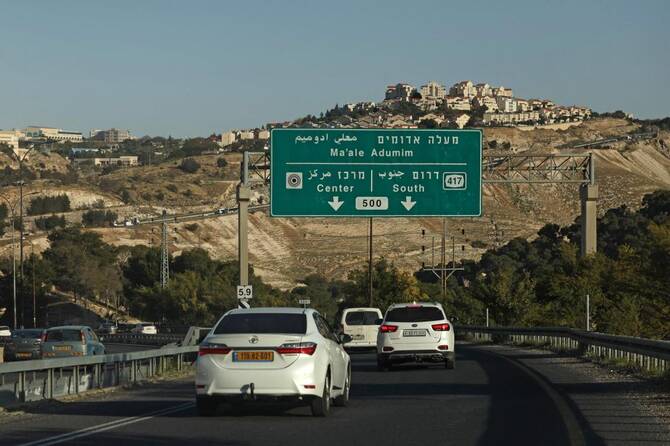
- ARAB NEWS
- 26 Aug 2025

KHAN Al-AHMAR, Palestinian Territories: A creeping Israeli presence is nothing new for the Bedouins who inhabit the arid hills east of Jerusalem, but a recently approved road in the area means the spectre of annexation now looms large.
Israeli authorities in March green lit the construction of a separate route for Palestinian vehicles to bypass a central stretch of the occupied West Bank — one of the territory’s most disputed parcels of land.
Israel has promoted the project as a way to further facilitate settlement expansion in the area near occupied East Jerusalem.
But Palestinians warn the move threatens to further isolate their communities and undermines hopes for a contiguous future state with East Jerusalem as its capital.
“If they open a road there, that’s it, this area will be annexed,” said Eid Jahaleen, who lives in the Bedouin village of Khan Al-Ahmar.
The village, a cluster of shacks and tents some 10 kilometers from Jerusalem’s Old City, sits surrounded by Israeli settlements.
“It’s going to be hard to reach out to the outside world. No Palestinian services will be allowed to get in here,” he said.
Pro-settler coalition
“If you want clothes, food for your home, (Israel) will be the one to open the gate.”
Israeli settlements are considered illegal under international law.
Outposts — unauthorized structures under Israeli law that often precede the establishment of a settlement — have spread rapidly across the West Bank since Prime Minister Benjamin Netanyahu returned to power in late 2022, leading a hard-line, pro-settler coalition.
After a new outpost appeared just 100 meters away, Jahaleen said he has “settlers on all sides.”
Israel heavily restricts the movement of West Bank Palestinians, who must obtain permits from authorities to travel through checkpoints to cross into East Jerusalem or Israel.
Far-right ministers have in recent months openly called for Israel’s annexation of the territory.
The alternative bypass would mean Palestinian vehicles driving north-south through the West Bank could travel directly between Palestinian towns rather, without passing the large Israeli settlement of Maale Adumim.
Israel has hailed the move as enabling settlement development between Maale Adumim and Jerusalem on a super-sensitive land corridor known as E1.
Israel has long had ambitions to build on the roughly 12 square kilometers, but the international community has repeatedly warned it could deal a fatal blow to a future Palestinian state.
Maale Adumim’s Mayor Guy Yifrach said the Palestinian bypass would reduce congestion on the current highway between the settlement and Jerusalem and “allow for a natural urban continuity” between the two.
Plans exist to build 4,000 housing units, schools, health clinics and a country club on E1, Yifrach said, but added they had not yet been approved.
Khan al Ahmar, E1 and Maale Adumim all lie within a planned section of Israel’s separation barrier for which construction has been frozen for years.
Israel says the barrier — made up of ditches, roads, razor wire, electronic fences, checkpoints and concrete walls — is necessary to prevent Palestinian attacks.
For Palestinians, the structure further separates them and drastically reduces their freedom of movement.
De facto annexation
Aviv Tatarsky, from the Israeli anti-settlement organization Ir Amim, said that once the road is built, Israel could go ahead with constructing the barrier as planned.
“They want to create this de facto annexation, which means take the space around Maale Adumim and make it an integral part of Jerusalem, of Israel,” he said.
By creating an alternative route for Palestinians to travel through the West Bank, Israel could argue that expanding Jewish settlements in the area would not compromise the contiguity of Palestinian territory, Tatarsky added.
For Mohammad Matter, from the Palestinian Authority’s Wall and Settlement Resistance Commission, the road “has nothing to do with making life easier for Palestinians.”
The bypass will trace the northern edge of Matter’s village of Al Eizariya, and he fears it will further squeeze Palestinians into isolated enclaves, connected only through transport corridors.
“They (Israel) are realizing their vision: Israelis walk up high and Palestinians walk through valleys or tunnels,” he said.
AFP